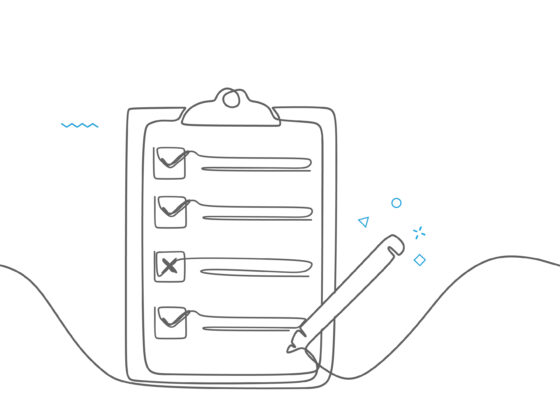Table of Contents
- 15 Interview Tips for Freshers in 2024
- Pre-Interview Preparation
- During the Interview
- 6. First Impressions Matter, Whether It’s Online or In-Person
- 7. Listen Up, Really
- 8. Keep It Clear and Concise, But Don’t Be a Robot
- 9. Let Your Excitement Show, Even Through a Screen
- 10. Ask Smart Questions, And Show You’re Thinking Ahead
- 11. Body Language Speaks Volumes, Use It Wisely
- 12. Tough Questions? Stay Cool
- Post-Interview Best Practices

Congratulations on completing your studies! As you transition from campus life to the corporate world, your first job interview is a critical milestone. It’s natural to feel a mix of excitement and nervousness as you prepare to step into this new chapter. In this blog, we’ll share essential interview tips for freshers, guiding you through each step to help you succeed. From overcoming interview anxiety to presenting your best self, these tips will equip you with the confidence to make a strong impression and land your dream job.
At Zolostays, we understand that the journey from student to professional is challenging, but with the right preparation, you can navigate it smoothly. Let’s dive in and start your career journey on the right foot!
15 Interview Tips for Freshers in 2024
Pre-Interview Preparation
1. Get to Know the Company, Really Know Them
Hey, I get it. Researching a company might seem like just another box to tick off your to-do list, but trust me, it’s your secret weapon. Whether you’re logging into a Zoom call, stepping into a shiny office, or attending a campus drive, you need to know who you’re dealing with. And I’m not talking about memorizing a few facts from their website. I’m talking about diving into their culture, understanding their values, and figuring out what makes them tick. When you know what they care about, you can show them that you care about the same things. And that, my friend, is how you stand out.
2. Match Your Skills to What They Need, Even if You’re a Fresher
You might be thinking, “But I’m just starting out, what do I even have to offer?” Here’s the thing, you have more to offer than you realize. Whether it’s a group project you nailed, an internship where you learned the ropes, or even volunteer work that taught you something new, these experiences matter. When you look at the job description, don’t just see it as a list of demands, see it as an opportunity to show how your experiences fit like a glove. And yes, that applies whether the job is remote, in-office, or a bit of both.
Not sure how to analyze a job description effectively? Check out our Guide on How to Read Job Descriptions for Freshers.
3. Craft Your Story, Make It Yours
You’ve got a story to tell, and it’s worth telling right. Your elevator pitch is like your personal highlight reel – a quick, compelling summary of who you are, what you’ve done, and why you’re awesome. And don’t worry about making it perfect; just make it you. Whether you’re on a video call or sitting across from someone, your pitch should feel natural and reflect the real you. It’s your chance to shine, so take it.
If you’re wondering how to summarize your experiences, our Tips and Templates for Writing a Resume for Freshers might come in handy.
4. Practice Like You Mean It, For All Kinds of Interviews
Interviews come in all shapes and sizes – remote, in-person, campus drives, you name it. That means you need to be ready for anything. Practice answering questions in front of your laptop camera, in front of a mirror, and even with a friend playing the role of interviewer. The goal? To get so comfortable that when the real interview comes, you’re cool, calm, and collected, no matter where you are.
5. Don’t Skip the Mock Interviews, They’re Gold
Look, I know mock interviews can feel awkward. But they’re worth every cringey moment. Grab a friend, set up a mock interview, and go through the motions as if it’s the real deal. Practice with someone who can give you honest feedback. And if you’re moving to a new city for job hunting or an internship, Zolostays is the perfect spot to find a like-minded community that can help you practice and prepare. You’ll be amazed at how much more confident you’ll feel afterward.
If you’re still planning your career path, our Step-by-Step Guide to Career Planning for Freshers can be a great resource.
During the Interview
6. First Impressions Matter, Whether It’s Online or In-Person
First impressions count, no matter where you are. If you’re in person, greet your interviewer with a firm handshake (yes, people still do that!) and a warm smile. If you’re on a video call, make sure your camera is at eye level, your background is neat, and you’re dressed like you mean business. Remember, confidence is key, and it shows.
7. Listen Up, Really
Interviews aren’t just about answering questions; they’re about having a conversation. So, when the interviewer speaks, listen, like, really listen. Don’t just nod and wait for your turn to talk. Take a moment to absorb what they’re saying, and let that guide your response. Active listening shows you’re engaged and interested, which is exactly what they’re looking for.
8. Keep It Clear and Concise, But Don’t Be a Robot
When it comes to answering questions, keep your responses clear and to the point, but don’t be afraid to let your personality shine through. Use the STAR method (Situation, Task, Action, Result) to structure your answers, but don’t let it box you in. If a story from your college days perfectly illustrates a point, go ahead and share it, just make sure it’s relevant and doesn’t go off on a tangent.
9. Let Your Excitement Show, Even Through a Screen
I get it—interviews can be nerve-wracking, and it’s easy to focus on getting the “right” answer. But don’t forget to show that you’re genuinely excited about the opportunity. Enthusiasm is contagious, and it can be the thing that makes you memorable. Whether you’re in a room with the interviewer or talking to them through a screen, let your passion for the role and the company come through.
10. Ask Smart Questions, And Show You’re Thinking Ahead
When the interviewer asks if you have any questions, don’t just ask about the next steps or the company’s dress code. Think bigger. Ask about the company’s future, the team dynamic, or how they’re handling the shift to remote or hybrid work. These kinds of questions show that you’re thinking about how you’ll fit into the bigger picture, not just how you’ll get the job.
11. Body Language Speaks Volumes, Use It Wisely
Even if you’re not in the same room, your body language still matters. On a video call, sit up straight, make eye contact with the camera (it feels weird, but it works), and use open gestures. In person, keep your posture confident, avoid crossing your arms, and use your hands to emphasize points when it feels natural. Positive body language reinforces the words coming out of your mouth, making you seem more confident and competent.
12. Tough Questions? Stay Cool
We’ve all been there—hit with a question that makes us want to disappear into the floor. The key is to stay calm and composed. Take a moment to think about your answer, and if you’re unsure, it’s okay to admit it. Showing that you’re willing to learn and grow can be just as impressive as nailing the perfect answer.
Post-Interview Best Practices
13. Don’t Forget the Thank-You Note, It’s a Game-Changer
You might be tempted to skip this step, but trust me—a thank-you note can make a big difference. Whether the interview was in person or online, sending a thank-you email within 24 hours shows that you appreciate the opportunity and are still thinking about the role. Mention something specific from the interview to show that you were paying attention and that you’re still excited about the possibility of joining the team.
14. Reflect on What Happened, It’s How You Get Better
After the interview, take a few minutes to reflect on how it went. What did you nail? What could you have done better? This isn’t about beating yourself up—it’s about learning and improving. Every interview, whether successful or not, is a stepping stone to becoming more confident and capable in the next one.
15. Keep Growing, The World’s Changing, and So Should You
The job market is always evolving, especially in the AI Era. Stay ahead by continuously learning and adapting. Whether it’s taking online courses, earning new certifications, or simply staying updated on industry trends, lifelong learning is your ticket to staying relevant and competitive.
And remember, if you’re moving to a new city for a job search or internship, Zolostays isn’t just a place to live it’s a community where you can grow, connect, and thrive.
Begin with a brief greeting and state your full name. Mention your educational background, highlighting any relevant coursework or projects. Discuss any internships, part-time jobs, or volunteer experiences that showcase your skills and dedication. Conclude by expressing enthusiasm for the role and how it aligns with your career goals. Keep it concise, professional, and ensure it reflects your personality.
Common questions include:
“Tell me about yourself.”
“Why do you want to work for our company?”
“What are your strengths and weaknesses?”
“Describe a challenge you faced and how you overcame it.”
“Where do you see yourself in five years?”
“Why should we hire you?” Prepare thoughtful responses to these questions by reflecting on your experiences and aligning them with the job requirements.
Acknowledge that while you may lack formal work experience, you have acquired valuable skills through education, internships, projects, and extracurricular activities. Highlight transferable skills such as teamwork, problem-solving, communication, and adaptability. Emphasize your eagerness to learn and your commitment to growing within the role.
Dress professionally to make a strong first impression. For most industries, this means a well-fitted suit in neutral colors like black, navy, or gray. Ensure your clothes are clean, ironed, and appropriate for the company’s culture. If unsure, it’s better to be slightly overdressed than underdressed. Pay attention to grooming and keep accessories minimal.
Body language plays a crucial role in conveying confidence and professionalism. Maintain good posture, offer a firm handshake, and make appropriate eye contact. Use natural gestures to emphasize points, and nod attentively while listening. Avoid fidgeting, crossing your arms, or displaying closed-off postures, as these can indicate nervousness or disinterest.
Ensure you have a reliable internet connection and a quiet, well-lit space free from distractions. Test your audio and video equipment beforehand. Dress professionally as you would for an in-person interview. Keep your background tidy and neutral. Maintain eye contact by looking into the camera and use clear, confident communication. Have your resume and any other necessary documents easily accessible.
Absolutely, asking questions shows your interest and engagement. You can ask about:
1. The specific responsibilities of the role.
2. Growth and learning opportunities within the company.
3. The company’s culture and values.
4. Current projects the team is working on.
How success is measured in the position. Avoid questions about salary or benefits in the initial interview unless the interviewer brings it up.
Send a brief and polite thank-you email within 24 hours of the interview. Express gratitude for the opportunity, reiterate your interest in the position, and mention something specific you discussed during the interview to personalize the message. This leaves a positive impression and keeps you fresh in the interviewer’s mind.
Preparation is key to reducing anxiety. Practice common interview questions and rehearse your answers. Use deep-breathing techniques to calm nerves before the interview. Visualize a successful interview experience to build confidence. During the interview, take a moment before answering questions to collect your thoughts, and remember that it’s a two-way conversation aimed at finding a good fit for both parties
Stay calm and composed. It’s okay to take a brief pause to think. If you truly don’t know, admit it honestly and express your willingness to learn. You can also try to relate the question to a similar experience or skill you possess. Avoid fabricating answers, as honesty and transparency are valued by employers.










